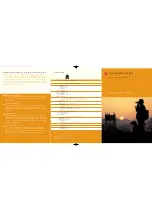
12
MODE SWITCHING
Press the [
] button to switch between the four
imaging modes of rainbow, iron oxide red, white
heat and black heat.
ZOOM IN/OUT
Under the power-on state, press the [
] key, and
each time you press it, the target of “2X, 4X” will
be gradually enlarged and displayed. Press again
to return to the normal state.
BRIGHTNESS ADJUSTMENT OF THE DISPLAY SCREEN
Under the power-on state, press and hold the [
]
key to adjust the brightness. Each long press ad-
justs the brightness by 1 level.
DIOPTER ADJUSTMENT
Rotate the diopter adjustment button left and
right to adjust the diopter for yourself.
FOCUSABLE LENS
Rotate the focus lens button left and right to fo-
cus. Rotate clockwise for near focus and counter-
clockwise for far focus.
INDICATOR LIGHT
Status
Not being
charged
In
charging
Fully
charged
Power on
Blue
Red blue
(purple)
Blue
Power off None
Red
None
APPLICATION OF AMPLIFICATION
The magnification function may be utilized when
remote objective is photographed so as to ob-
serve the objective clearly. The effect picture is as
follows:
Normal
2X
4X
APPLICATION OF COLOR PALETTE
The color palette menu may change the pseudo
color of infrared thermal image and provide six
types of color palettes: rainbow, iron oxide red,
white heat, black heat, yellow, bird watching.
The selection of proper color palette can show
the details of target object in a better manner.
The color palette of rainbow and iron oxide red
focuses on display of color and is very suitable for
the condition of high heat contrast and used to
improve color contrast between high temperature
and low temperature. On the other hand, the col-
our palettes white heat and black heat provide a
greyscale image. White heat is particularly suita-
ble for detection at greater distances.
The image effect photographed with six types of
color palette.
Rainbow
Iron oxide
red
White
heat
Black
heat
Yellow
Bird watching
UNDER-FLOOR HEATING, TERRESTRIAL HEAT
AND LEAKAGE POINT - DETECTION SKILL
1. Heat the floor for 3 minutes.
2. Adjust the ambient light to darkest. Stabilize the
instrument and not shake it. Stand to detect
large area.
3. Pieces of pipes appears in non leakage image.
The locality of leakage point is red.
4. A large area of red appears if floor temperature
is high. The effect is better if reducing tempera-
ture first and rising it up again.
Note:
1. Suggest that the under-floor temperature is
above 40° C. The preheating time is more than
3 minutes. (Make adjustment according to
depth of under-floor heating pipe concretely).
2. Don't be too close to the floor. Suggest making
observation for large area.
3. The locality of leakage point will appear a imag-
ing area.
4. If the temperature is too high, it needs to turn
off the under-floor heating. Rise temperature
of the under-floor heating for detection after
the floor reduces to normal temperature.
Summary of Contents for 9630902
Page 3: ...3 ...







































